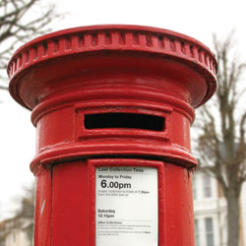Accountancy firm PKF has released guidance for charities on reducing the VAT on their post, following recent increases.
The firm explains that the rise in charity postage costs over the last couple of years, particularly by Royal Mail and Parcelforce, is partly the result of the imposition of VAT by Royal Mail on many of its services, and on all services provided by Parcelforce.
However, PKF advises there are three ways a charity may be able to reduce its VAT exposure on postage services (full details of the current VAT position of various postal services can be found on the Royal Mail website).
Combine printing and delivery
The first option, PKF advises, is to make sure that the same firm both prints and delivers materials (magazines, periodicals, newspapers and so on) to its members. Such products are zero-rated, meaning that the organisation pays VAT but can claim it back.
A charity could find itself paying VAT on services provided by Royal Mail, Parcelforce, or a commercial provider such as TNT. Therefore PKF advises contracting with their printer to post as well as produce the literature. If the printer does both, the whole charge levied by the printer could be zero-rated.
“This is because the charges for delivery normally follow the same VAT liability as the underlying goods,” explained PKF’s Jim Gempton. “Furthermore, there is no additional VAT cost for the printer, who will be able to reclaim in full any VAT charged by the postal services provider.
“A number of printers and fulfilment businesses are actively marketing this service, so take advantage of it if you can.”
Use a downstream access deliverer
PKF’s second piece of advice is for charities to switch from Royal Mail to what is known as a Downstream Access (DSA) deliverer.
"DSA providers have an agency agreement with Royal Mail that allows the VAT exemption to be retained for many postage services that would otherwise be subject to VAT,” said Gempton. “In essence, the commercial provider collects and sorts the mail, and then uses Royal Mail for the final delivery service. The commercial provider’s services are VATable, but the Royal Mail’s element (which makes up most of the overall charge) remains exempt from VAT.”
Gempton did however warn that that TNT has recently initiated proceedings in the High Court to argue that Royal Mail’s part of these access services should not be exempt from VAT. Since HMRC and Royal Mail are fighting to retain the exemption, the litigation is likely to take “a number of years to resolve”, so this might not be a long-term option.
Apportion membership subscriptions
PKF offers one final option for charities which are unable to action either of the above: they can make a claim to HMRC for the tax back on the proportion of a member's subscription fee that is for the delivery of literature, since such products are potentially zero-rated (subject to HMRC scrutiny). This is known as ‘apportioning’.
“HMRC have a long-standing concession on membership organisations, including charities,” Gempton explained. “These organisations have members who pay a set fee for their membership, which gives them a range of benefits, and it is classed as ‘multiple supply’ for VAT purposes – there are different elements which have a tangible value and may have different VAT liabilities. Anything that is zero-rated can be claimed back."
Gempton added that whilst this concept is nothing new, the ability to apportion membership subscriptions and treat any printed matter as zero-rated could now be more important to charities than ever.
Refund opportunity
Finally, PKF has pointed out an opportunity for organisations to potentially reclaim VAT 'embedded within' amounts previously paid to Royal Mail and Parcelforce, and said that many organisations have submitted protective claims to HMRC to recover the VAT already.









